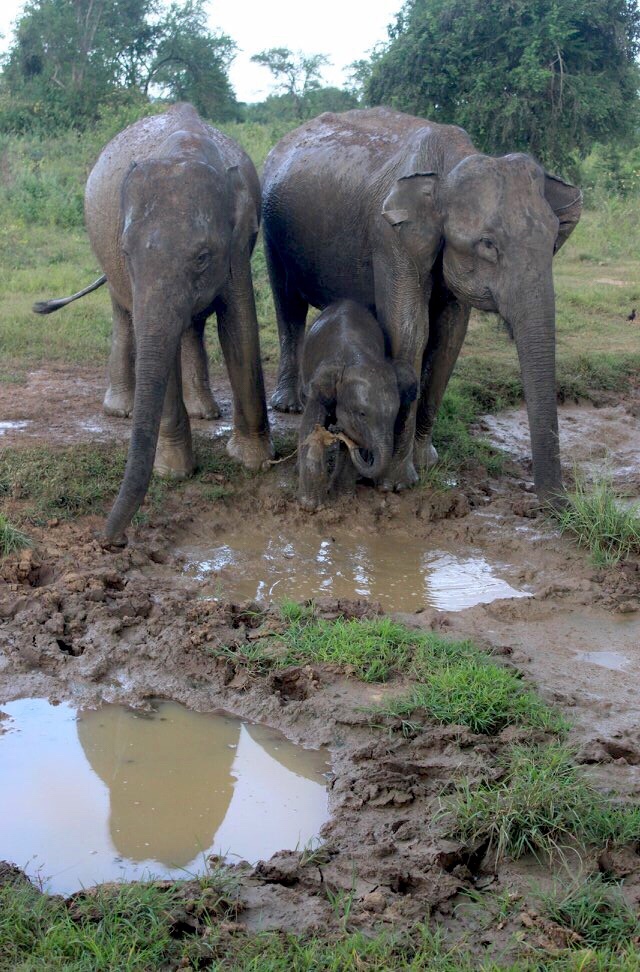Elephants are 1 of the 3 only animal species that mourn the death of their own. According to Jason Goldman, journalist at the BBC, elephants, chimpanzees and dolphins have portrayed similar behaviours to human’s when they come across a death of their own. When the young of a chimpanzee has died, the mum walks around carrying it for days after the death. When a dolphin dies the pod swim around the corpse and keep it protected from predators for days following.
Everyone know’s my love for Elephants, I wanted to write about the similarities they have to us humans, despite the very obvious differences.
Let’s start with their brains. The elephant’s brain is the largest among all mammals according to a book called “Do elephants feel pain and if so, how do we know this” by researcher Jeheskel Shoshani et al. While the size of your brain doesn’t make you smarter, just like people with bigger heads can still be dumb, there is a method known as encephalization quotient (in short, EQ) that is used to estimate an animal’s intelligence. It compares the actual size of an animal’s brain against body mass.
In terms of EQ, the elephant scores on average 1.88, compared to a pig, who scores 0.27. Just to clarify, a female elephants EQ is higher than the males (girl power!). While an Elephants EQ is far lower than a humans, who on average score 6.5, there are many similar aspects and behavioural traits. An Elephant, like human, can distinguish individuals. And even more impressively, they can distinguish humans by their voices. A study in 2014 by researches from the University of Sussex in UK discovered that Elephants can tell a human’s age and ethnicity through the sound of their voices. The elephants began to act aggressive and defensively when they heard the voice recording of men from the Masai tribe in Kenya, a tribe that has a history of poaching elephants, but were not phased by another recording of women and children from the same tribe.
According to a science journal in the BBC from 2001, written by Briggs, another similar aspect is that like humans, elephants have a very complex hippocampus and cerebral cortex – responsible for will-power and problem solving. This also contributes to their great memory.
Female elephants are said to exhibit superior memory, they can recognize old feeding sites or distinguish between the urine scent of up to 30 female relatives, even if they have been separated for many years.
The older the female elephant, the more experienced she is at recognising familiar faces and alerts the herd when an oncoming elephant is a friend or foe. This allows the herd to concentrate on feeding and breeding.
Briggs goes on to say that the sad truth is many times, poachers kill the older, larger members of the herd, leaving the herd more vulnerable and dimming their chances to survive.

Source: Dailymail
Because of this strong memory, elephants also show signs of grief over the past. Like I said, elephants mourn the death of their own and they do so by touching the body with their feet and caress their bodies with their trunk.
While their intelligence and memory sets these creatures apart, it is their display of emotions that really shows us how similar elephants are to humans. I have already talked about grief, but joy and happiness is always seen when a herd of elephants are together. Two occasions in an elephant’s life are marked with great happiness, the birth of a baby and the reunion of separated family members. In the documentary from 2010 called “Echo:An Elephant to remember”, a reunion like this is seen. Loud bellowing is heard sometimes from even a quarter of a mile away and then there pace quickens as they are about to meet before they rub against each other with flapping ears, it’s like a real life Hollywood film!!

Terror and fear is also shown, when for example a baby African elephant is seen waking up in the middle of the night screaming, in the same documentary, after she has witnessed her mother being poached – a sign of post-traumatic stress. Human’s show the same behaviour when they have experienced a traumatic event.
There is a lot more that I can say that I discovered in my research about these magnificent animals that captured my awe but today I wanted to highlight the three most prominent similarities between man and elephant – the ability to recognise individuals, their memory and their empathy.
Despite these similarities, we still have a long way to go before the human race give elephants the equal respect and treatment they deserve. With Poaching, elephant riding and using elephants for heavy load, we continue to harm them and the first step is to educate…..
What else do you love about elephants 🙂



What a gorgeous piece about these glorious gentle giants. I was totally captivated and not at all surprised to learn that the females are more intelligent!
I adore the way they move their trunks, but am always a little weirded out by how small their eyes are, seriously, why so small?!
LikeLike
Reblogged this on thewanderlostcampaigner and commented:
Smitten with the research gone into putting this insightful little piece together. Plus, ELEPHANTS!
LikeLike